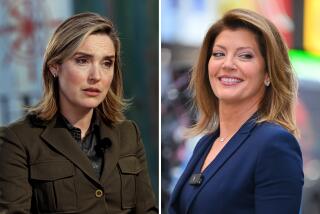Debate for Two Is a Loss for Voters
Looking forward to more prefab politics?
If you liked the empty spectacle of the Republican and Democratic conventions--not to mention “Dick Morris Presents the Politics of Values”--you’ll love the Ping-Pong of the presidential debates. That’s what you can expect if the debates are between Bill Clinton and Bob Dole. Many political and media establishment types prefer it that way, because no one else seems to have much of a chance to win. By this standard, of course, the inept Dole could be excluded as well, leaving us with no need for debates at all. Not that the president couldn’t fill the air time.
The nonpartisan (read: controlled by the two-party political establishment) Commission on Presidential Debates is scheduled to tell us Sept. 16 who gets to debate. It seems more interested in “viability” than in spurring a serious debate about where America is headed.
Lest any Republican suspect me of carrying water for the Clinton campaign, I would open the debates to include not just Reform nominee Ross Perot, who is actually a danger to Dole and Clinton, but also Green standard-bearer Ralph Nader and Libertarian candidate Harry Browne.
The debates commission co-chairman Paul Kirk, Washington lawyer and former Democratic national chairman (his Republican counterpart is Frank Fahrenkopf, head of the national gambling lobby), said that a lot of weight will be given this year to polls and the media’s view of the candidates. The three lesser known candidates don’t stack up especially well there. But the fact is that no one, not even the brand name nominees, has inspired much confidence. Both Clinton and Dole have favorable ratings well below 50%.
Neither Perot nor Nader nor Browne may have the answers as potential presidents. But they do have some of the questions. And they are not questions that Clinton, Dole or much of the Washington establishment wants to talk about.
* How far and how fast should we go in globalizing the U.S. economy? The acceleration of technology makes further economic integration with the rest of the world inevitable and in some respects desirable. But ranking figures in both party establishments want to expand “free trade” agreements, beyond even NAFTA and GATT, to encompass Latin America and much of Asia. What unpleasant surprises await us there, as they did in Mexico, and who among our work force would be affected next?
* How do we move beyond slashing welfare--an infinitesimal portion of the federal budget--to get our books in order? For all the bipartisan blather about a balanced budget, neither Clinton nor Dole wants to talk about upper middle class entitlements, corporate welfare or the Pentagon, whose budget both men want to increase.
* What concrete steps will be taken to slash the extraordinarily pervasive and perverting power of money in politics? The New York Times reports that Clinton spends more time on fund-raising than has any other president. Small wonder that his is the most corporate-oriented Democratic administration since the robber baron era a century ago. For his part, Dole had to shut down a purported public policy think tank, the “Better America Foundation,” which was caught using vast sums from secret donors as a political slush fund.
It’s foolhardy to expect TV personalities or reporters to drive these matters in a presidential debate. None would get outside the thoroughly ritualized theater that conventional American politics has become and of which the media are an integral part. Only debaters can do that. Which is why Perot, Nader and Browne are needed in the mix: to make sure that the 1996 debates don’t devolve into the political equivalent of “Tastes Great” vs. “Less Filling.”
More to Read
Get the L.A. Times Politics newsletter
Deeply reported insights into legislation, politics and policy from Sacramento, Washington and beyond. In your inbox three times per week.
You may occasionally receive promotional content from the Los Angeles Times.










